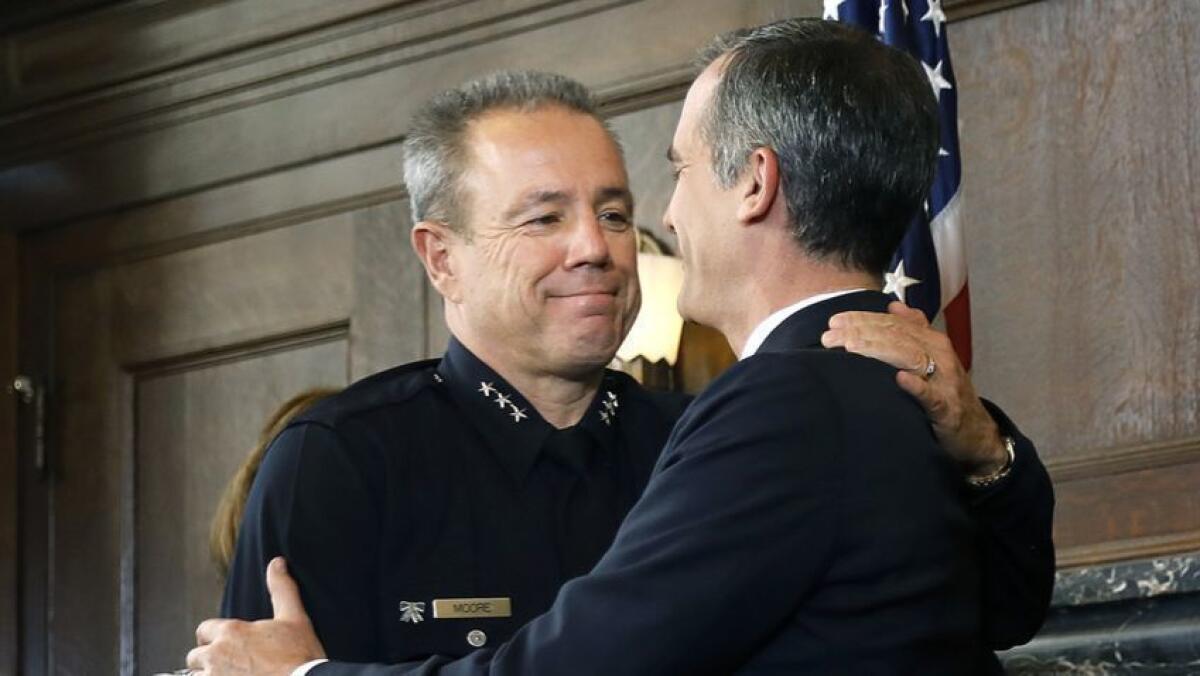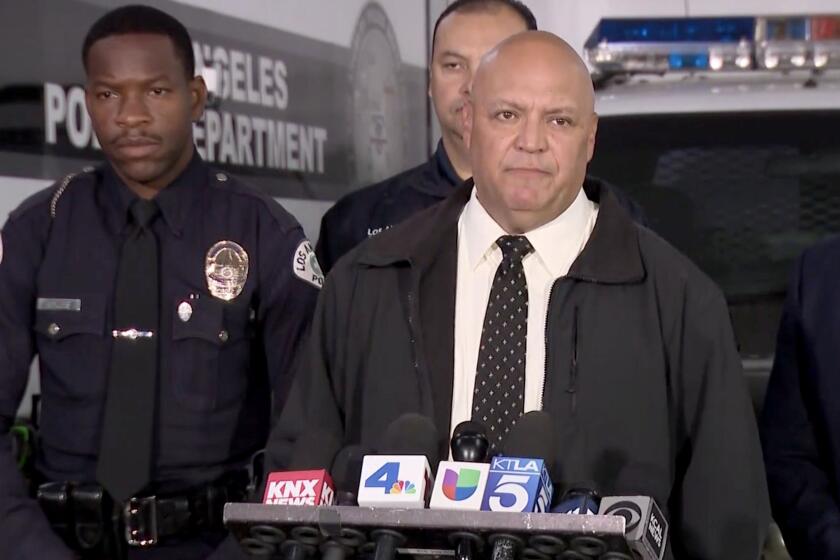Before becoming LAPD chief, Moore retired, collected a $1.27-million payout, then was rehired

Before Michel Moore was promoted to become the Los Angeles Police Department’s new chief in June, he took a brief, highly unusual retirement.
He left as chief of operations for only a few weeks before rejoining the force in the same job at the same pay. But the move provided him with a financial windfall: a lump sum retirement payment of $1.27 million from the city.
Moore, 58, received the money thanks to his enrollment in the city’s Deferred Retirement Option Plan, or DROP, which pays veteran cops and firefighters their pensions, in addition to their salaries, for the last five years of their careers.
The extra pension payments go into a special account that the employee receives at the end of the five years — so long as they formally retire.
Moore said in an interview that the plan to have him retire and then return almost immediately to work was proposed by former Chief Charlie Beck and approved by Mayor Eric Garcetti.
A few months after he returned to work, Garcetti appointed the well-respected, 36-year veteran as the department’s next chief.
Because chiefs are excluded from DROP, if Moore had won the promotion before he retired he would have been forced to forfeit the $1.27 million in order to take the job. Several other L.A. police and fire chiefs — including Beck — have lost their DROP payments that way.
Moore said he did not know that he would soon become chief when he agreed to retire and come back to work as operations chief. At that time, Beck had not announced his plans to depart. And when he did, Moore was one of several finalists for the job.
“You may call it suspicious timing, but I didn’t program it that way,” Moore said.
The unusual sequence of events raised questions among veteran government watchdogs.
Police and fire department leaders “have very sharp pencils and they stay up all night trying to figure out how to suck as much out of the city as possible,” said former L.A. Chief Administrative Officer Keith Comrie, a critic of the DROP program.
It’s common for senior LAPD and LAFD officials to receive large DROP payments on their way out the door. Since 2008, 51 members of the departments with “chief” in their title — assistant chief, deputy chief, battalion chief — have completed the program.
Of those, six have walked away with more than $1 million, according to a Times review of city data. Their average payment was $794,000.
The program, which was tried and abandoned in many cities because of the cost, has paid out more than $1.6 billion in extra pension checks to Los Angeles police and firefighters since its inception in 2001. Officers don’t have to work extra hours or perform extra duties to receive the money; it’s a reward for longevity.
Former Los Angeles Mayor Richard Riordan, who pitched DROP as a way to retain veteran officers and help the departments make succession plans by knowing when employees are going to leave, has since acknowledged it was a mistake.
Garcetti supports the program.
Moore returned through a rarely used mechanism known as “the bounce,” which allows the chief of police to bring a retired officer back for up to year if their work is so specialized they can’t quickly be replaced.
The bounce has been used sparingly in the past. An example cited by multiple LAPD officials is a homicide detective whose case might fall apart if he weren’t personally available to see it through to conclusion.
A Times search of city records turned up only five LAPD employees since 2008 who came back after receiving their DROP payments. The others were detectives, sergeants and captains. Moore was the only deputy chief.
Moore said he fully expected to leave the department in January when his five-year term in DROP ended. Under the normal rules of the program, he would have had no choice.
But, Moore said, Beck approached him last fall with the plan to bring him back because the department was struggling to find another top administrator who was the right fit for Moore’s job as head of operations — even though the department had five years to find a successor.
“The point of this was something that would be a benefit to [Beck],” Moore said. “Then he asked me to keep it to myself because he had to talk to the mayor and the [chief administrative officer] to see if there would be support to do this.”
Beck said in an interview that he firmly believed “Mike met all the criteria and was vetted within the parameters of what was allowed, and it occurred months before I announced I was going to retire.”
Department spokesman Josh Rubenstein said Moore is a singular talent, “who really has another level of understanding.”
“Our office was made aware of Chief Moore’s plans,” said Garcetti spokesman Alex Comisar. “LAPD needs talented, experienced officers like Chief Moore on the job as long as possible.”
After Moore retired, the rules required him to stay away for at least 30 days. Moore said he took a road trip across the country with his wife, skiing at Breckenridge in Colorado and visiting a daughter in Nashville, before returning to his $299,000-per-year job in March of this year.
The retirement also netted him about $170,000 for unused sick and vacation days, city records show. And because he was officially retired, he was able to collect his $240,000-per-year pension on top of his salary when he returned to work.
Beck announced he was stepping down in January, just before Moore’s brief retirement began. Moore, who was a finalist for the job in 2009 when Beck became chief, threw his hat in the ring again. He has also been a candidate for the top jobs at the Dallas and San Diego police departments recently.
Moore said he was as shocked as everyone else when Beck announced his pending retirement.
That sequence of events spared Moore an agonizing decision other prospective chiefs have had to make — the prestigious appointment or the huge pile of money in their DROP account.
When Beck was offered the chief’s job, he had not been in the DROP program as long as Moore, but he still had a $350,000 payment waiting for him if he walked away.
To the “chagrin” of his wife, Beck said, “I opted out of the program and gave the money back in order to become chief.”
Forcing that decision on prospective leaders is a serious flaw in the DROP program, Moore said. It limits the pool of candidates because some qualified people simply aren’t willing to give up the money.
If he’d been forced to decide, Moore said, “It would have been a very difficult decision to make.… I have a family to support.”
Times Staff Writers Ryan Menezes and Richard Winton contributed to this report.
Follow on Twitter at @JackDolanLAT
More to Read
Start your day right
Sign up for Essential California for news, features and recommendations from the L.A. Times and beyond in your inbox six days a week.
You may occasionally receive promotional content from the Los Angeles Times.







